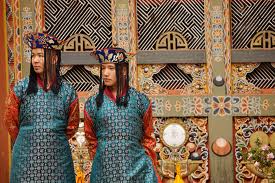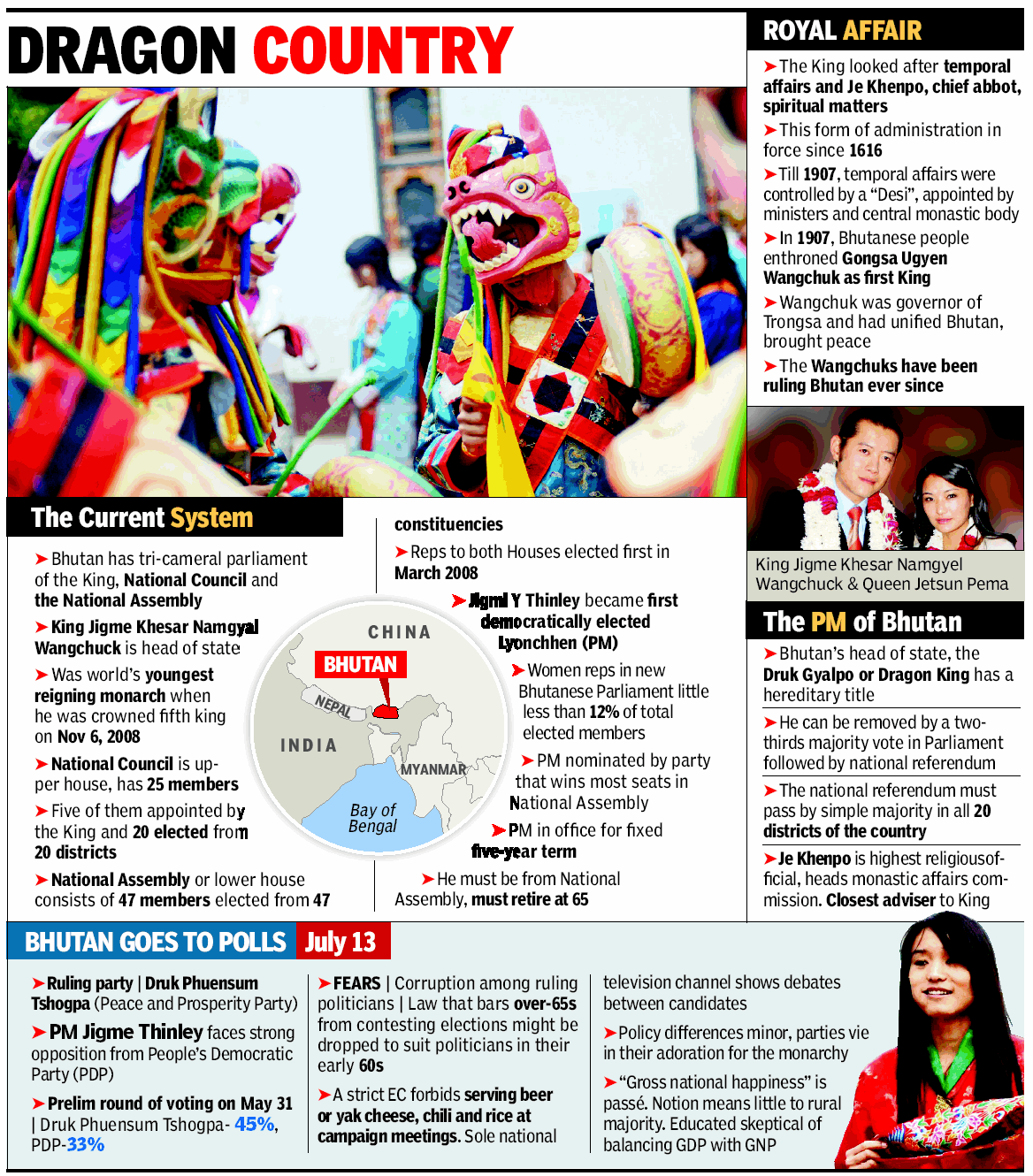Bhutan: Government
This is a collection of articles archived for the excellence of their content. Readers can send additional information, corrections, photographs and even Readers will be able to edit existing articles and post new articles directly |

Contents |
BHUTAN’S THREE GIANT LEAPS
FIRST BIG REFORM
Third King Jigme Dorji Wangchuk set up National Assembly (Tshogdu) in 1953
It elected members representing Gewogs (smallest administrative units)
This was legislating body, people discussed national issues
SECOND BIG REFORM
Setting up of Royal Advisory Council (Lodoe Tshogde) in 1963
Served as link between king, council of ministers and people
Liaison ensured projects’ timely implementation King Jigme Singye Wangchuk set up District Development Committee in 1981 (Dzongkhag Yargay Tshogdue)
In 1991, he set up Gewog Yargay Tshogchhung (block development committees)
THIRD BIG REFORM
The 1998 devolution of powers to cabinet ministers
King became head of state while PM head of govt
PM has council of ministers
Constitution signed in 2008
The National Assembly
The National Assembly has 47 members. A party that wins 24 seats or more can form the government.
2008: the first parliamentary elections
The Druk Phuensum Tshogpa (DPT) won the elections. The People's Democratic Party (PDP) got just two of the 47 seats. The DPT, with 45 legislators, ruled the country for five years with Mr. Jigmi Y Thinley as the prime minister.
"In 2008, we got just two seats because DPT said we had no experienced leaders ," remarked Jatsho while reviewing the 2008 defeat.
2012
PDP won just 12 seats as against DPT's 33 in the primary election held in May last to choose the two top parties eligible for Saturday's poll. Druk Nyamdrup Tshogpa (DNT), which had won two seats in the primary round, merged with PDP.
2013: the second parliamentary elections
People's Democratic Party (PDP) won 32 seats while ruling Druk Phuensum Tshogpa (DPT) got 15 seats in the 47-member National Assembly
The peaceful elections were marked by a heavy voter turnout of 80 per cent of a total of 380,000 electors.
India provided logistical support, including gifting nearly 4,130 Electronic Voting Machines (EVMs) to Bhutan
2013: the main poll issues
The voting took place in July 2013. Less than two weeks before votes were cast, an India cut off the kerosene and cooking gas subsidy to Bhutan since a pact with the country had expired on June 30. This became a major campaign issue.
During the campaigning, the rival parties tried to impress upon people that concerns like India's withdrawal of subsidy on would be resolved once they form the government.
Ahead of the elections, PDP general secretary Sonam Jatsho said, "Indo-Bhutan relations are so strong that you cannot imagine that it can be harmed due to some minor issues".
On its part, India assured Bhutan that it will not make it "suffer" and will proceed on the issue of gas and kerosene subsidy in "full consultation" with the new government there. At the same time, India maintained that "careful accounting" was required to ensure proper usage of the subsidy.
PDP's chances grew manifold after word spread that India was not happy with DPT, especially Thinley, when campaigning gained momentum after the preliminary round. This was followed by a bitter argument between the two parties over whether India would help Bhutan implement its 11th five-year plan. Delhi contributes almost 70% of every plan.
The main cause of "discord" between India and DPT-ruled Bhutan is said to be Thinley's meeting with then Chinese premier Wen Jiabao in Rio last year without taking India into confidence. Besides, Delhi is also understood to be upset with the DPT government's decision to establish diplomatic ties with 32 countries in five years.
The parties
The kingdom follows a bi-party system.
Druk Phuensum Tshogpa
In 2008 DPT won because it had a number of heavyweights, including former PM Jigmi Y Thinley, as its candidates. Thinley's family has served the palace for generations. "It was Thinley's father who had composed our national anthem ," said a journalist. Compared to this, PDP had mostly nominees who were little known in the country.
People's Democratic Party (PDP)
PDP is known as an organization whose foreign policy is in alignment with that of the Bhutanese monarchy, which stands for a strong friendship between India and Bhutan.
PDP was founded by Sangay Ngedup, an uncle of former monarch Jigme Singhey Wangchuck (the 2013 monarch's father). After the 2008 defeat, Ngedup quit politics, paving the way for Tshering Tobgay (born 1966) to take charge of PDP.Tobgay, an alumnus of Harvard University, is a former civil servant.
The system of governance: a chart
The Times of India 11/7/2013
Sources for this article include
PTI | Jul 13, 2013 [1]
See also
Bhutan: Government
